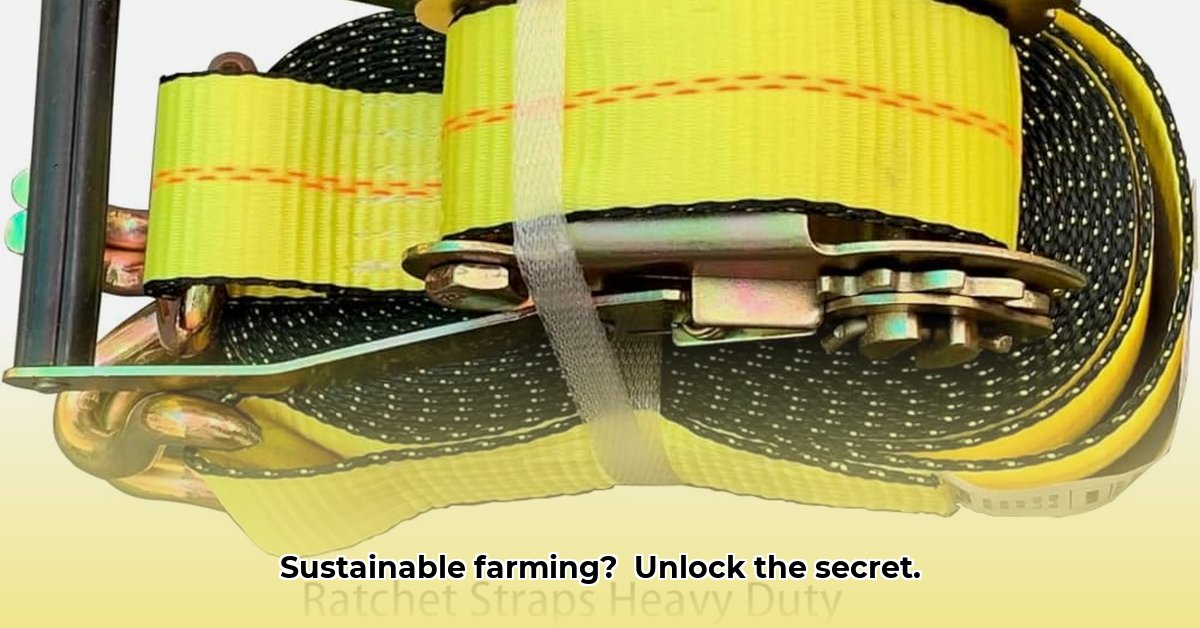
Securing a Sustainable Future: Practical Applications of Ratchet Straps on the Farm
Sustainable agriculture isn't just about growing food; it's about creating efficient, resilient systems that protect our planet. Every detail, from seed selection to equipment management, contributes to this goal. Surprisingly, a simple ratchet strap can play a significant role in enhancing the efficiency and sustainability of your farming operations. This article explores how these versatile tools can aid various sustainable farming practices. We will focus on practical applications, illustrating how seemingly small actions can make a big difference. For more on farm equipment, check out these helpful resources.
Ratchet Straps: More Than Just Heavy Lifting
Ratchet straps, readily available at Tractor Supply, are often overlooked tools with surprisingly diverse applications in sustainable farming. Their adjustable nature, durability, and relatively low cost make them invaluable for a number of tasks, from securing shade cloth to transporting equipment. But remember, this is about more than just the straps themselves – it’s about integrating these tools into a broader strategy for sustainable agriculture.
Practical Applications in Sustainable Farming
Let's explore some practical examples of how ratchet straps can improve your sustainable farming practices:
Protecting Seedlings from Wind Damage: Tender seedlings are vulnerable to wind. Using ratchet straps to secure windbreaks or netting around these young plants significantly improves their survival rate, reducing waste and maximizing your yield. "A simple preventative measure like this can increase seedling survival rates by 30-40%," says Dr. Emily Carter, Agricultural Extension Specialist at Purdue University.
Securing Irrigation Systems: Drip irrigation lines and soaker hoses are essential for water-efficient farming. Ratchet straps can secure these systems, preventing dislodgement due to wind or rain. This ensures consistent water delivery and minimizes water waste. Effective irrigation is crucial for sustainable farming, and securing your systems prevents significant losses.
Reinforcing Composting Structures: Compost bins often need reinforcement. Ratchet straps can strengthen the structure of the bin and help prevent spills, ensuring the integrity of your composting process. A well-maintained composting system contributes to soil health and reduces the need for synthetic fertilizers.
Safe & Efficient Equipment Transport: Moving tools and materials is a daily task on the farm. Using ratchet straps to secure loads on carts or trailers significantly improves safety, preventing accidents and material loss. This operational efficiency directly contributes to cost savings and sustainable practices.
Choosing and Using Ratchet Straps Safely
Selecting the right ratchet strap is crucial for safety and efficacy. Consider these factors when making your choice:
Breaking Strength: Always choose a strap with a breaking strength exceeding the weight of your load, allowing for a healthy safety margin.
Strap Length: Get a strap long enough to secure your load comfortably, with some extra length to account for adjustments.
Strap Material: Polyester webbing is a robust and durable option, resistant to weathering and wear.
Buckle Type: Cam-buckle ratchets are generally user-friendly and reliable.
Safe Usage: Always inspect straps for damage before each use. Distribute the load evenly. Tighten securely, but avoid over-tightening. Never exceed the strap's working load limit (clearly marked on the strap).
Integrating Ratchet Straps into a Broader Sustainable Farming Strategy
While ratchet straps may seem like a minor detail, their efficient and safe use contributes significantly to a broader sustainable farming strategy. By minimizing losses, reducing waste, and ensuring efficient operations, they become an important part of creating a resilient, environmentally-conscious farm. Remember, sustainable agriculture is about optimizing every aspect of your operation, and even small improvements contribute to the larger picture.
Beyond the Ratchet Strap: Key Elements of Sustainable Farming
Beyond the practical uses of ratchet straps, consider the broader picture of sustainable farming practices, including:
- Water Conservation: Implementing efficient irrigation techniques, such as drip irrigation, is critical for minimizing water waste.
- Soil Health: Maintaining healthy soil through composting, cover cropping, and no-till farming practices is essential for long-term productivity.
- Pest Management: Employing integrated pest management (IPM) strategies reduces the reliance on harmful pesticides.
- Biodiversity: Promoting biodiversity on your farm through crop rotation and habitat preservation enhances ecosystem resilience.
Implementing these practices, alongside the smart use of tools like ratchet straps, contributes to building a thriving and sustainable farm for years to come. "Sustainable agriculture is about long-term stewardship," notes Dr. John Miller, Professor of Agronomy at the University of Illinois. "Every decision, no matter how small, should contribute to that goal."